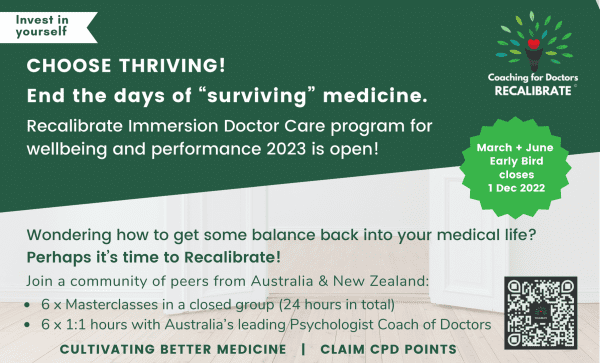Where are all the men?
How do male doctors develop their human skills?
How do men develop their human skills in relationship, communication and self care?
In 2022 we really got excited with 7 men and 8 women completing our Recalibrate program!!
It was the first time male and female participants had neared parity in our immersion doctor care program in five years of delivering it.
A turning point it seemed. Yay!
These things are highly dynamic though and registrations for 2023 again looks at least 80% female. 🙁
This is a loss for us all in terms of diversity in our individual Recalibrate groups, in our alumni community and in the wider working environment of health.
When it comes to developing our human skills in self care and interpersonal relationships, women doctors too often do the heavy lifting.
According to the Australian Government Department of Health and Aged Care there are more than 104,000 medical doctors in Australia. (2020 figures). In 2020, 43% of our doctors were women, with 51% of new medical graduates being women and increasing over time.
In NZ in 2022 there were 18,780 doctors registered, 47.4% of them women.
So why would it be that communication and wellbeing courses, retreats and the like are consistently welcoming 70 – 90% women participants?
Where are all the men?
When it comes to interpersonal skills we can not say definitively if one gender is more developed than the other. Nor can we say any gendered group has better wellbeing skills, the categories are simply too broad with too many confounding variables.
Not to put too fine point on it, joining the dots is a risky strategy. Here it goes anyway….
What we can say is that 75% of people who die by suicide in Australia are men.
Around the world men suicide 3-4 times more than women.
When it comes to doctors specifically, they have significantly higher rates of suicidal thoughts than the general population, with female doctors most at risk of suicide.
Is that why women come to these programs more willingly?
Are women more aware of their risk, are they simply more proactive
Is it more socially or professionally acceptable for women than men to work on their interpersonal and self care skills?
Looking from another lens, Zerger and Folkman study men and women leaders. They found in their 2020 study that women leaders rated more positively than men on 13 of 19 leader competencies that were assessed. Women’s leadership in the study was characterised as more collaborative, people oriented and focused on team wellbeing.
But can we extrapolate anything from either of these gender findings about mental health or leadership when it comes to doctors being well, performing well, providing better care to patients or being more sustainable in their work?
In the five years we have delivered Recalibrate, our doctor care immersion program, 53 doctors have registered, 47 have graduated.
The registration numbers when it comes to gender balance have improved from a five year low of 1:9 in 2019.
After five years 35 women and 18 men have joined the program to lean into developing their intra and interpersonal skills in a community of peers.
Overall we have twice as many women completing Recalibrate as men. Does it matter?
We think it does.
Our male graduates who continue this work in our Recalibrate alumni community tell us the skills they have developed have made a huge positive difference to their experience of working in medicine and to their lives more generally.
They add so much to the community in general, we value their insights and experience enormously as we grapple together to understand the complex world of medicine.
To the male doctors reading this blog, we extend a warm and hearty invitation to you to join us by registering for Recalibrate 2023 and taking your human skills to the next level.
Skills you will continue to use and value for years to come and a community of support like no other.
The first two Recalibrate groups for 2023 are nearly full. Don’t delay! Find out more
References
National Mental Health Survey of Doctors and Medical Students
Medical Council of New Zealand, Workforce Survey
Harvard Business Review, Research: Women Are Better Leaders During a Crisis
Sharee has been coaching doctors since 2014, find out more about her work
Want to experience how Coaching helps Doctors?
Wondering how to get some balance back into your medical life?
Perhaps it’s time to Recalibrate!
Applications are now open for Recalibrate our signature immersion doctor care program.
Choose between February, March or June cohort. But be quick, places a filling up fast!
Sharee’s new book The Thriving Doctor is available in all good bookstores on online.

